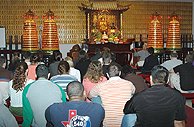 Today my wife and I took another visit to the Jade Buddha Temple (my third visit, her second). We practiced some various forms of meditation before having Dharma talk, lead by Josten. The Sister Venerable Shiou-chih was also present and offered input.
Today my wife and I took another visit to the Jade Buddha Temple (my third visit, her second). We practiced some various forms of meditation before having Dharma talk, lead by Josten. The Sister Venerable Shiou-chih was also present and offered input.As a Humanist who has long valued the questioning of authority, positive skepticism, and a rational scientific questioning of claims, today's discussion was amazingly familiar and surprising.
Behold my non-Buddhist friends - this is from what is called the Kalama Sutra:
• It is proper to have doubt.
• Do not be lead...
- by reports, traditions, or hearsay;
- by the authority of religious texts;
- by mere logic or inference;
- by considering appearances;
- by the delight in speculative opinions;
- by seeming possibilities;
- by the idea "this is our teacher".
• Know for yourselves that certain things are unwholesome, wrong, and bad; then give them up.
• Know for yourselves that certain things are wholesome and good; then accept them and follow them.
• [Buddha] told the [monks] that a disciple should examine even the [fully enlightened Buddha] himself, so that the disciple might be fully convinced of the true value of the teacher whom he followed.
• Rely not on the teacher/person, but on the teaching.
• Rely not on the words of the teaching, but on the spirit of the words.
• Rely not on theory, but on experience.
• Do not believe in anything simply because you have heard it.
• Do not believe in traditions because they have been handed down for many generations.
• Do not believe anything because it is spoken and rumored by many.
• Do not believe in anything because it is written in your religious books.
• Do not believe in anything merely on the authority of your teachers and elders.
• But after observation and analysis, when you find that anything agrees with reason and is conducive to the good and the benefit of one and all, then accept it and live up to it.
These concepts were presented in the notes passed around, and attributed to http://www.alc.enta.net/kalama.htm.
For Humanist, Skeptic, and Freethinker points of reference, I might offer these few among many:
From the Houston Church of Freethought:
"freethinker, n.: a person who forms his opinions about religion independently of tradition, authority, or established belief."
From the Humanist Manifesto III:
"Knowledge of the world is derived by observation, experimentation, and rational analysis."
From the Council of Secular Humanism:
"[Secular Humanism is] A conviction that dogmas, ideologies and traditions, whether religious, political or social, must be weighed and tested by each individual and not simply accepted on faith."
From Skeptic Magazine:
"Skepticism is a provisional approach to claims. It is the application of reason to any and all ideas - no sacred cows allowed."

After observation and analysis, this is one part of Buddhism that makes perfect sense to me. ;) Some other parts, such as karma and reincarnation... eh, sound a little too superstitious IMHO.
ReplyDeleteHi Flashcat, thanks for the comments!
ReplyDeleteThere are 'secular interpretations' of both of these concepts (reincarnation & karma). I would advise looking into these interpretations more. If in the end we still like some things and dislike others, that's ok too :)
Secular interpretations of karma and reincarnation?? Can you point me to something online?
ReplyDeleteYes, it's nearly impossible to take any one ideology in its entirety; they all seem to have faults and weaknesses somewhere, or some (or much) of their beliefs are too out-of-date.
:)
True, I don't think we should be surprised by this, given that the major and older religions and philosophies of the world are the complex products of input from many peoples and cultures over long periods of time. I prefer, therefore, to ignore the semantic borders and boundaries of various religious labels and names, and focus instead on individual ideas, ideals, and philosophic elements. Truth is too valuable a resource not to mine it from where we can.
ReplyDeleteAs for the secular interpretations, I plan in the near future to be outlining some of these concepts, which I will provide references for.
With Compassion, :)
Daniel
For reference, that information is now here:
ReplyDeletehttp://humanistcontemplative.blogspot.com/2008/05/naturalistic-approach-to-buddhist-karma.html